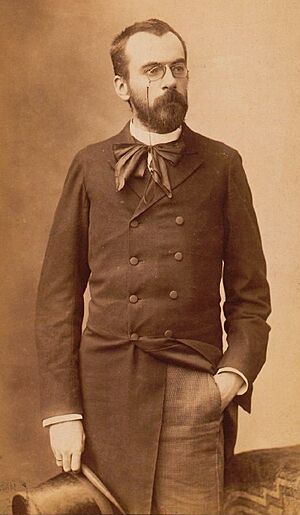Alfred Bruneau facts for kids
Alfred Bruneau (born March 3, 1857 – died June 15, 1934) was a French composer who helped bring a new style called realism into French opera. Realism in opera meant telling stories that felt more true to life, often about everyday people and their struggles, rather than just kings and queens or myths.
Contents
Who was Alfred Bruneau?
Alfred Bruneau was born in Paris, France. When he was young, he studied the cello at a famous music school called the Paris Conservatory. He even played in an orchestra named Pasdeloup. Soon, he started writing his own music. One of his first pieces was a long song for voices called a cantata, named Geneviève de Paris.
Early Music and Works
In 1884, one of his orchestral pieces, Ouverture héroïque, was performed. He also wrote two choral symphonies, which are like big songs for an orchestra and choir, called Léda (1884) and La Belle au bois dormant (1886). In 1887, he created his very first opera, Kérim.
Working with Émile Zola
A very important part of Bruneau's life began in 1888 when he met Émile Zola. Zola was a famous French writer who also believed in realism. They became great friends and worked together for twenty years!
Operas Inspired by Zola
Bruneau's 1891 opera, Le Rêve (which means 'The Dream'), was based on a story by Zola with the same name. Over the next few years, Zola's stories gave Bruneau many ideas for his operas, including L'attaque du moulin (1893). Zola even wrote the words (called the libretto) for two of Bruneau's operas himself: Messidor (1897) and L'Ouragan (1901).
Other operas by Bruneau that were influenced by Zola's ideas include:
- L'Enfant roi (1905)
- Naïs Micoulin (1907)
- Les Quatres journées (1916)
- Lazare (which was performed after Bruneau had passed away in 1954)
Other Important Works
Bruneau also wrote operas based on stories by other famous writers. For example, he used themes from Hans Christian Andersen for Le Jardin du Paris (1923) and from Victor Hugo for Angelo, tyran de Padoue (1928).
His orchestral music, which is music for a large group of instruments, showed the influence of another famous composer, Richard Wagner. Bruneau also wrote a Requiem (a special piece of music for remembering the dead) in 1888. He created two collections of songs called Lieds de France and Chansons à danser.
Later Life and Legacy
Alfred Bruneau was recognized for his contributions to music. He received a special award called the Legion of Honor in 1895. He passed away in Paris in 1934. His work helped shape the sound of French opera by bringing more realistic stories to the stage.
See also
 In Spanish: Alfred Bruneau para niños
In Spanish: Alfred Bruneau para niños
 | Madam C. J. Walker |
 | Janet Emerson Bashen |
 | Annie Turnbo Malone |
 | Maggie L. Walker |


